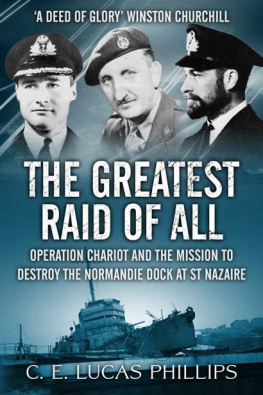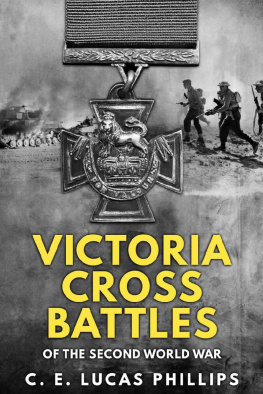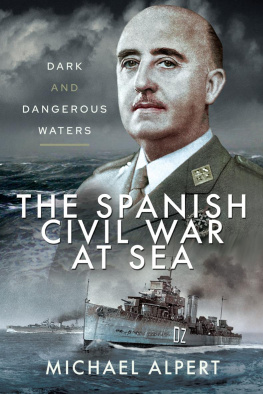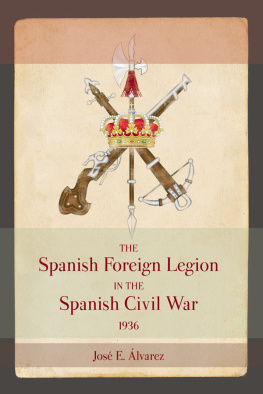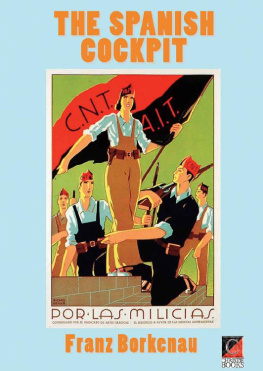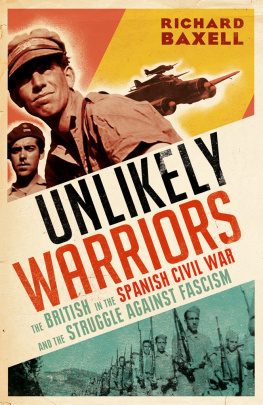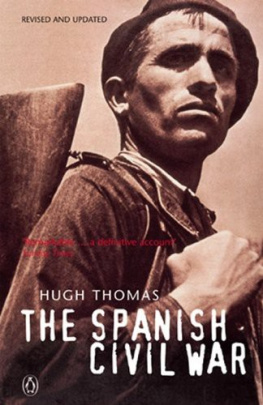C. E. Lucas Phillips - The Spanish Pimpernel: The True Story of One British Man’s Mission to Save Lives in the Spanish Civil War
Here you can read online C. E. Lucas Phillips - The Spanish Pimpernel: The True Story of One British Man’s Mission to Save Lives in the Spanish Civil War full text of the book (entire story) in english for free. Download pdf and epub, get meaning, cover and reviews about this ebook. year: 2021, publisher: Sapere Books, genre: Detective and thriller. Description of the work, (preface) as well as reviews are available. Best literature library LitArk.com created for fans of good reading and offers a wide selection of genres:
Romance novel
Science fiction
Adventure
Detective
Science
History
Home and family
Prose
Art
Politics
Computer
Non-fiction
Religion
Business
Children
Humor
Choose a favorite category and find really read worthwhile books. Enjoy immersion in the world of imagination, feel the emotions of the characters or learn something new for yourself, make an fascinating discovery.

- Book:The Spanish Pimpernel: The True Story of One British Man’s Mission to Save Lives in the Spanish Civil War
- Author:
- Publisher:Sapere Books
- Genre:
- Year:2021
- Rating:4 / 5
- Favourites:Add to favourites
- Your mark:
- 80
- 1
- 2
- 3
- 4
- 5
The Spanish Pimpernel: The True Story of One British Man’s Mission to Save Lives in the Spanish Civil War: summary, description and annotation
We offer to read an annotation, description, summary or preface (depends on what the author of the book "The Spanish Pimpernel: The True Story of One British Man’s Mission to Save Lives in the Spanish Civil War" wrote himself). If you haven't found the necessary information about the book — write in the comments, we will try to find it.
The Spanish Pimpernel: The True Story of One British Man’s Mission to Save Lives in the Spanish Civil War — read online for free the complete book (whole text) full work
Below is the text of the book, divided by pages. System saving the place of the last page read, allows you to conveniently read the book "The Spanish Pimpernel: The True Story of One British Man’s Mission to Save Lives in the Spanish Civil War" online for free, without having to search again every time where you left off. Put a bookmark, and you can go to the page where you finished reading at any time.
Font size:
Interval:
Bookmark:
THE SPANISH PIMPERNEL
C. E. Lucas Phillips

TABLE OF CONTENTS
AUTHORS NOTICE
This book is a chronicle of the exploits of Captain E. C. Lance, D.S.O., during the Spanish Civil War of 19369. Based, for the greater part, on information and contemporary records supplied by him and by other participants in those events, it is as reliable as I have been able to make it under the clouds that obscure much of that dark and bloody conflict. Fear still prevents many from speaking openly, bias many from speaking impartially and the fallibility of memory others from speaking with certainty on points of minor detail. Authentic official records are sparse and difficult of access. For any small inaccuracies that may have crept in I therefore ask the indulgence of those who may have been concerned in these affairs and whom I have been unable to reach.
The names of some persons are indicated either by an initial letter, or by single inverted commas. This has been done sometimes because the identities, especially of a few of the escapists, are uncertain, sometimes to spare pain or embarrassment, and in yet other instances to avoid the sharp knives of malice or revenge that might even now await the participants in these events. For more obvious reasons, certain of the British diplomatic and consular officers also are intentionally made anonymous.
For convenience of narration, some of the minor events have been placed a little out of their actual chronological sequence.
Among the several people who have so kindly assisted me in assembling these facts, I am especially grateful to Mr E. G. de Caux, the distinguished correspondent of The Times in Madrid during the Civil War.
C. E. LUCAS PHILLIPS
CHAPTER ONE: IN THE EMBASSY BAR
On a hot summer morning in 1936 a cheerful company of men and women gathered together before luncheon in the Embassy Bar in Madrid. It was a small, modern, smart little place in the Paseo de la Castellana, not at all typically Spanish and frequented by a lively, cosmopolitan crowd.
As they came in severally from the Castellana, where the pavements and the buildings quivered in the overpowering noonday heat, the visitors relaxed in the cool shade, greeted one another cheerfully in English or Spanish and called for drinks. For the most part they drank extremely dry sherry or iced pomegranate juice with soda. With these they also ordered camarones , the shrimps which in Spain are continually nibbled to ward off the morning hunger. To these habitus , who were mainly British, Americans and Spaniards of the smarter set, life pursued an equable and agreeable tenor, not seriously disturbed by the tremblings of the earthquake which was not very far beneath their feet.
Among those who came in from the withering heat were Captain Edwin Christopher Lance, British civil engineer, and his wife Inger Mary, better known as Jinks, or sometimes Jingles. They had just come from matins at the British Embassy church nearby. Both were slight, fair, vivacious, gregarious, and on this morning they were in high spirits. To them, as to their friends, the dense and sombre crowd in the Castellana, through which they had forced their way, was a commonplace in the fevered existence of Spain. As they entered the bar, they saw a group of people clustered before a window, glasses in hand, and among them they recognized the tall and handsome Eric Glaisher and the rugged, vivacious little Bill Hall, both of the London and South-American Bank. One of them called out:
Come and watch the fun!
Joining them, the Lances looked with animated amusement upon the scene that was staged in the broad, tree-lined Castellana outside. There in the harsh sunshine they saw a great mob in shirt sleeves, some of them armed, swaying and shouting with excitement, waving their fists in the air as they faced a large platform draped with many flags. Mounted Civil Guards, impressively smart in their grey uniforms and glossy, black, tricorn hats, stood on guard on either side, and on the platform itself, in sombre incongruity, there sat a party of men clad in black. Lance could not help laughing as he said to Jinks:
Just like black beetles!
One of these figures, fat and white-faced, rose to his feet as they watched and, doffing his hat to disclose a bald pate, began to wag his baldness up and down and to harangue the crowd with the rattle and volley of his urgent Castilian.
Inside the Embassy Bar one of the Spaniards said:
Good heavens! Its Azaa!
Others had recognized him, too, and in the group of spectators in which Lance and his wife found themselves there was a quickening of interest. This could be no ordinary or casual meeting, for Manuel Azaa was President of Republican Spain, no less. There also, the spectators noticed, was Largo Caballero, extremist leader of the Spanish Socialist Party.
The group of foreigners watched with added interest, but still with an amused detachment, for Spanish politics, a thorny dialectic jungle in which some twenty-four different parties and groups contended with increasing confusion amid an entanglement of their own creation, were no concern of theirs. With the rarest possible exceptions, the British and other foreigners took no sides in Spanish politics, which they looked upon either with complete indifference or with some element of cynical amusement.
Accordingly, even Azaas presence would not for long have held the attention of the spectators in the Embassy Bar, especially as they could hear nothing of what he said. They were about to turn away when a troop of cavalry appeared right ahead, leading a procession of some sort. What now? Were the Anarchists or the Communists about to hot up the so-called Socialists? Or was it some right-wing outfit?
Whoever the new arrivals were, they brought sensation with them. As the head of the procession came abreast of the cluster of black beetles, someone hurled a hand-bomb on to the platform. As one, those on the platform went flat on their faces.
They waited for several seconds. Then, as no second attack came and no one seemed to be hurt, they rose to their feet as the smoke cleared away and looked apprehensively around as pandemonium erupted and spasms of indiscriminate musketry crackled and flickered over the disordered scene. The meeting began to disrupt.
To the spectators in the Embassy Bar, one might have supposed that the violent act would have caused consternation. That, in the twentieth century, men should throw bombs among a crowd in the capital of a western European state must, one would think, have appeared an outrage upon society. But no such feelings occurred to Lance and his friends. Indeed, they merely burst into laughter at the comicality of the prostrated politicians and the spectacle of mass funk that it represented. For such episodes had become commonplaces of life in Spain, to such an extent that any sense of moral outrage, or even of surprise, had long atrophied. However, on this occasion the disorder and the shooting were near enough to be alarming to those in the Embassy Bar. As the senseless rifle-fire proliferated and the bullets ricocheted and whined, Lance said to his wife:
Better get away from all this glass, Jinks. Pop yourself in a corner while I get some suitable drinks.
As everyone withdrew from the windows Lance went up to the bar and ordered:
A cognac and soda for the seora, please, and, for me, I think the most appropriate thing to steady the nerves would be one of your iced vodkas.
Outside, the crowd swirled and roared in the broad avenue under the dusty acacias. Lance and his wife were marooned for more than an hour, and then, against everyones advice, they escaped, using the back door of the bar. They had not gone ten yards down the street before, from a recessed doorway, a rifle-shot rang out at Jinkss ear. She was unhurt, but Lance hurried her home as quickly as possible to their flat in the Calle de Espalter. On arrival, they found their trusted Spanish maid, Petra, in a state of high excitement. She had been told by Antonio, the porter of the flats, she said, and by various friends that terrible times were about to begin in Spain. She had never spoken in such a manner before and the Lances were surprised.
Next pageFont size:
Interval:
Bookmark:
Similar books «The Spanish Pimpernel: The True Story of One British Man’s Mission to Save Lives in the Spanish Civil War»
Look at similar books to The Spanish Pimpernel: The True Story of One British Man’s Mission to Save Lives in the Spanish Civil War. We have selected literature similar in name and meaning in the hope of providing readers with more options to find new, interesting, not yet read works.
Discussion, reviews of the book The Spanish Pimpernel: The True Story of One British Man’s Mission to Save Lives in the Spanish Civil War and just readers' own opinions. Leave your comments, write what you think about the work, its meaning or the main characters. Specify what exactly you liked and what you didn't like, and why you think so.

